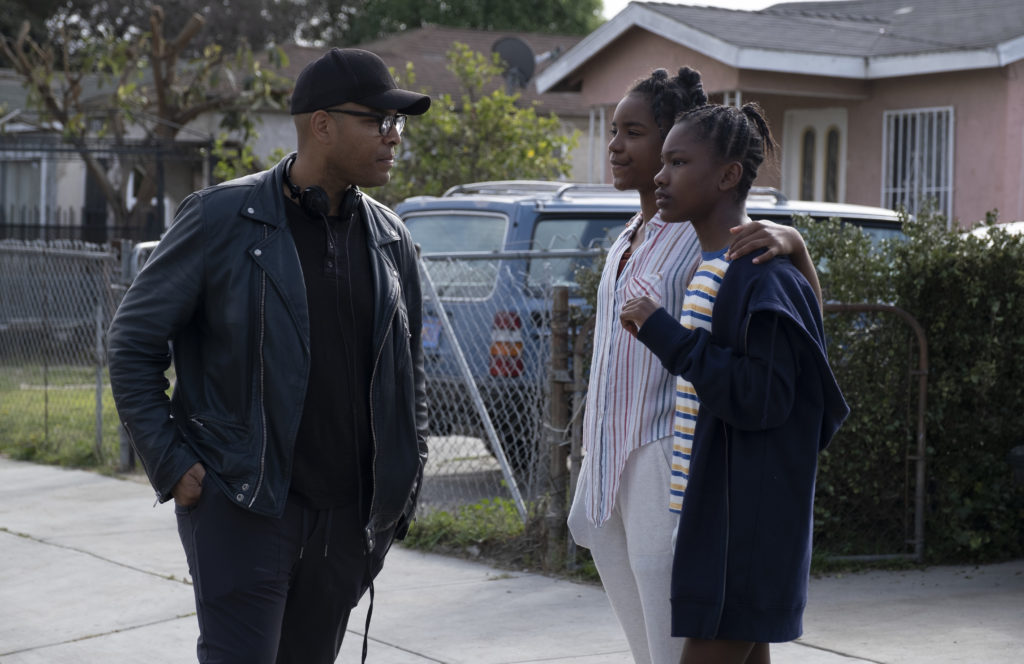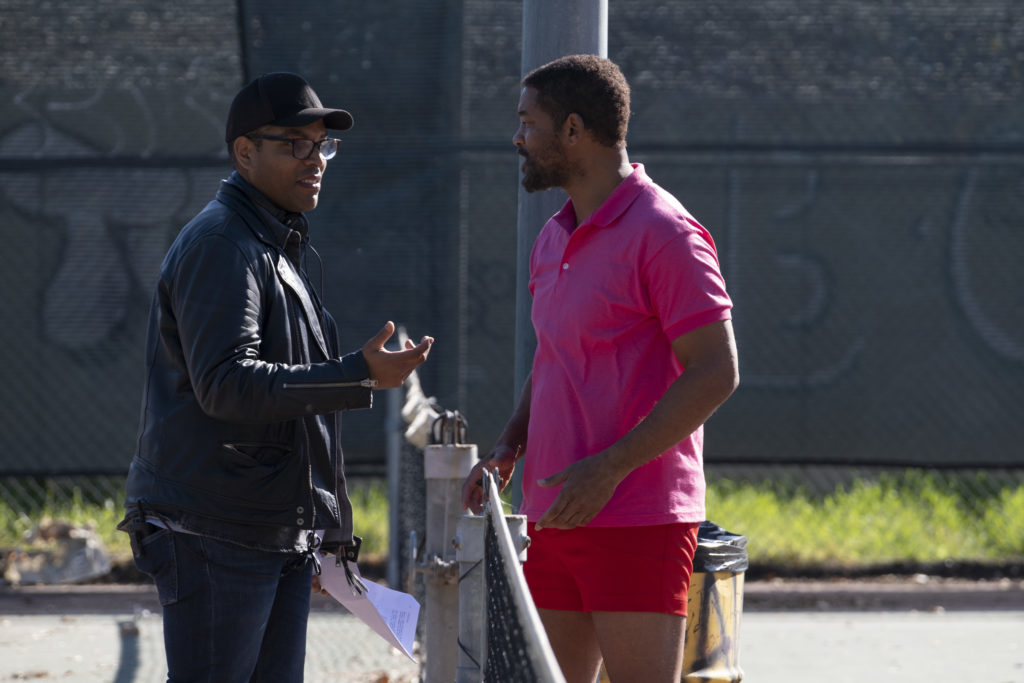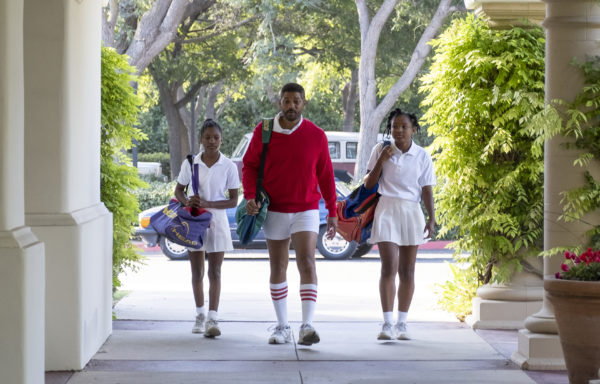Warner Bros.’ King Richard is the true story of royalty—tennis royalty. Will Smith brings his ample charisma to the role of Richard Williams, a man with a plan to transport his family from the shabby Los neighborhood of Compton by grooming his daughters Venus and Serena to become superstars in a sport unaccustomed to the presence of African-Americans. That Richard’s single-minded agenda comes true is a miracle made for the movies. Written by Zach Baylin, King Richard is both a complex character study and an uplifting tale of a family united by a dream.
Aunjanue Ellis (“Lovecraft Country,” If Beale Street Could Talk) lends strong support as Richard’s equally formidable wife, Oracene, while Saniyya Sidney and Demi Singleton rise to the challenge of playing the young Venus and Serena. The cast also includes Tony Goldwyn and Jon Bernthal as the girls’ famed coaches, Paul Cohen and Rick Macci.
King Richard was directed by Reinaldo Marcus Green, who won a Special Jury Prize for Outstanding First Feature at the 2018 Sundance Film Festival for Monsters and Men, a powerful triptych drama about the police killing of a black sidewalk vendor in Brooklyn and its impact on three residents. Green’s sophomore feature Joe Bell, a road movie starring Mark Wahlberg, debuted in theaters this past July. Boxoffice spoke with Green by phone from Baltimore during a break from shooting the HBO mini-series “We Own This City,” based on Baltimore Sun reporter Justin Fenton’s book about the corruption of the city’s Gun Trace Task Force. King Richard opens in theaters and debuts on HBO Max on Nov. 19.
Why do you think you were hired for this project?
I had a very personal connection to the material. Not being a tennis player, but being an athlete and someone that grew up kind of like [Venus and Serena]. I was on a baseball field for the first third of my life with a father who thought he was raising a Major League baseball player. So I had a father that was very similar to Richard—he’s very eccentric in that way, but he also beat us over the head with love, my brother and I. He wasn’t that crazy parent who made it miserable—he made us love baseball. And so I had that experience. I’m the same age as Serena, I grew up in an area akin to Compton on the East Coast. It was rough, and I know what that was like. I also showed a picture of myself and my dad dressed in these crazy costumes. And anybody seeing that would know this is a very, very similar story with a similar journey.
Richard is such a complex character. Did you kind of psychoanalyze him to figure out why he was the way he was?
I tried to get my hands on everything I possibly could—articles, anything on the internet. The blessing that we had was their sister Isha Price, who’s also a producer on the film, and Lyndrea Price, who’s a costumer. So we had all these stories of Richard from the family’s perspective. The media and the world portrayed him one way, and then you have this very, very different view from the family side. And then in the pre-production process, myself, the writer Zach Baylin, and Tim White and Trevor White, the producers, were fortunate to meet Venus and Serena and Oracene. So we had these stories that were quite contradictory to the way the media had portrayed Richard—the love, the devotion, the amount of hours, the care, the attention, how protective he was. We had this different insight into who Richard was as a man and as a human, and not just somebody that was out there for different reasons. So having access to those real-life stories—and each sister had a different version of their story, because they were different ages and their memories are very different. But the most accurate through-line was how much love and devotion Richard and Oracene gave to those girls. It became much more of a family dynamic: All the sisters were hanging signs, all the sisters were picking up balls, and it was five girls in a VW bus, not two. It wasn’t just Venus and Serena going to the court, it was the whole family. [Their input] added this dimension to the script that I just ran with. It gave me insight into their world and things I didn’t know about them.
Did Richard also have input?
He did through his daughters, for sure. They communicated with Richard pretty regularly. They’re very close—they see him regularly, they talk with him regularly, so we were very aware that he was aware of the movie. They had constant feedback, and obviously my conduit was Isha the producer.

One thing I find interesting is that you never see any kind of pushback from Venus and Serena. It seems like they’re totally with their father’s program.
I can only speak to growing up in a black and Latino household. I know that for sure we don’t slam doors, we don’t talk back. I didn’t want to misrepresent something like that, just for the sake of drama. A lot of households, especially people of color, we don’t play that, that’s not gonna happen in our house. That’s more accurate than having the kids be very vocal and talking back and screaming and storming upstairs—that definitely didn’t happen in my house, and I know for sure it didn’t happen in their house. They were obedient kids, they listened to their parents, and that was just the way they set the tone in that house. It was just out of respect. I know for sure culturally, out of my friends’ circle and a lot of folks that I know and people of color, that’s just how that goes down in our circumstance. I think that’s very accurate, that you wouldn’t have Venus slamming a door or doing something wild or talking back to Mom or Dad. Nah, that’s not real. At least in the community I grew up in, that would never happen.
Back in the ’90s. Will Smith was the king of summer movies. Were you at all starstruck working with him?
Who’s not starstruck by Will Smith? But Will has an amazing way to disarm people. I think that’s what makes him brilliant as an actor, but also as a human being. He’s immediately just so personable—he’s very warm, very generous, very open. And this was everybody on set. From the whole pre-production process, Will was such a collaborator. I think he comes from an era where you respect the director, and that’s something that is important in the process—one vision, not all these cooks in the kitchen. Ultimately, that was the process that we created from the very beginning, that we were going to create our little family. We had just a great rapport, a great bond. We’d talk about our fathers, Will talked a lot about being a father to a daughter and what that experience was like, what he can bring to the table. And then we spent a lot of time working with Zach on the script. We had eight weeks of prep, and we brought all the girls in. My job was to become a family off the screen so that it was seamless on the screen. It just felt like we really created a family—and then you add Aunjanue to the mix and you have a really dynamic duo. The chemistry was off the charts. There’s a lot of luck in that, but there’s also a lot of work that goes on behind the scenes when it comes to building that rapport. And we had the time—pre-shutdown, shutdown and then post. Our additional five months of shutdown became a prep period for us. We utilized all that time to get it nuanced and all the dynamics that we possibly could for that family. And Will was a true collaborator in that process.
Aunjanue Ellis is such a strong presence in the movie. She’s been doing great work for years, and this film is such a good showcase for her.
Aunjanue is magical. She’s a force to be reckoned with. When I met Oracene, one of the very first things she said to me was: Don’t make me a chump. So I knew I needed a tough person that could go toe to toe with Will. I’ve seen Aunjanue in a bunch of roles where I thought she could bring that and then, man, her eyes, her intensity. She really is powerful in her silence, in her gaze—she’s just able to do a lot. And she’s not only as brilliant as an actor, she’s also very giving, and she gave a lot to those girls. She’s doing a lot with a little, and I think she really delivers.
I can’t imagine the pressure your two young actresses must have felt playing two icons. How did they handle that?
Oh my God, they handled it with flying colors. We were fortunate that this wasn’t their first rodeo. Both had worked with very high-caliber actors—Viola Davis, Denzel Washington, Forest Whitaker—so they came with high acting pedigree. For them, it was the rigorous tennis, that they had to get their bodies in mental and physical space. Carrying the weight of portraying living legends is really tough for anybody, let alone being 12 and 13 years old at the time they started this. They did a remarkable job, incredible work. But they loved each other. Literally there were times where I was like: Hey, guys, we’re rolling, let’s go. Like they were just in love and giddy. But it wasn’t just the two of them. We had five girls that were truly connected, and I think you can feel that. They’re super close, even to this day. I remember in prep, I said to Saniyya: ‘You’re the older sister, you’ve got to call Demi every night until we start shooting. That’s your baby sister, and you got to check up on her.’ And they really stayed in touch and they did their homework. I think they’re true stars in the making.

I just watched Monsters and Men, which is an excellent movie. I noticed in that film, too, you’re so good at family scenes and making them feel real and authentic. What’s your secret to creating that atmosphere on a set?
You’re looking for the truth. Anything that’s false…if I’m cringing when I’m looking at it, I can’t do that. But I think we try to beat it up enough so that it feels real. That goes for everything from set design to costume and wardrobe to background extras—everything is important to the frame. And we spent a lot of time in rehearsal to try to get that. A lot of the work is done before we get to set, getting everybody into the mental headspace about where we need to be. It’s a collaboration—you put in great actors and they’re able to make great choices. That makes my job a little easier, for sure. But a lot of it is, if I believe it, then it’s real. I have to be the sort of truth barometer. When I’m looking at the monitor, I’m looking at my actors and saying: Hey, I believe that this could happen. And I think the way to do that is to put people in real situations. So in Monsters and Men, I have actors around real police officers. I like to do that a lot in my work, put actors with non-actors. You can get a lot of things that are raw. You see that in shows like ‘The Wire,’ where you have professional actors with non-professional actors.
When I saw the name Robert Elswit [the Oscar-winning DP of There Will Be Blood, Magnolia, and Syriana, among many other films] on the credits, I was very impressed. That must have been a nice safety net for you.
Yeah. I was blessed that I took Monsters and Men to the Sundance Lab the summer that I shot the movie. Robert happened to be an advisor that year. So I met Robert, and I also met Pam Martin, who edited the film, the summer before I shot Monsters and Men. They had nothing to do with the movie, but they were advisors, I remember getting their email addresses and telling them, ‘Hey, if I ever make it or something, maybe I can get you to read a script one day.’ And then sure enough, fast forward three years later, I’m knocking on the door. I met Robert in a café in L.A. and he said yes. And I thought: Did Robert Elswit just say yes to shoot my movie? It was a magical moment. You’re talking to somebody that went to film school and essentially grew up watching his movies and is a fan of his cinematography. He’s not only become a collaborator, he’s become a friend. Robert is the hardest-working person I’ve ever met in this industry, and he’s 72 years old. He’s somebody that literally has seen every movie. We would go on essentially dates and watch everything that was in the theater. I’m the kind of person who says, ‘No, that doesn’t look that interesting, let’s wait for VOD,’ but Robert sees everything. He watches good, bad, everything in the middle, he’s just a student of the craft. I thought I worked hard until I met him—the energy he has is remarkable. It’s so inspiring to be around someone that is as committed to the craft at 70 as they were when they were 25. And he’s still learning, he still wants to learn and still feels like he has more to learn. I think that’s the mark of any true great artist, and I hope to take that with me in whatever I’m doing next. It certainly rubbed off on me—I feel like I’m a different filmmaker.
King Richard will play day-and-date on HBO Max. Can you offer a pitch of why people should see this in a theater?
It’s like any film experience, right? You remember those movies that you saw projected. This movie grows and gets bigger, and it’s got a sports epic quality to it. It really plays great on the big screen. It’s communal, and because it’s a family film, you really want to get out there. I was fortunate to screen the film in an actual AMC when we were testing it, and just to hear people laughing and hear the sniffles, to hear people really get into it, made it all the more reason for making it. Look, we shot large format and it’s always great when you’re able to see the nuances on the big screen. Oftentimes when you’re home, you’re texting, you’re looking at other stuff—you can’t do that in a movie theater, so it’s a different experience. Look, you can enjoy it on any device, and I encourage people who are not ready to go out to catch it on HBO Max. But for people that feel comfortable and feel like they want to get out there, I think it’ll be a special experience for them.
I’m glad I saw it on a big screen for sure. There’s a lot of awards buzz around this movie. How are you handling that in your headspace?
Well, right now I’m directing a six-part limited series with David Simon and George Pelecanos in Baltimore, so I am as busy as they come, my feet on the ground, doing something that I love. I handle it by being busy in the right way, not worrying about the world, Look, I hope for the film that people can see it and have an emotional experience. I hope for our cast and for our crew that they get their due. There are some amazing young performers and Aunjanue and Will, so many people who dedicated so much. And below the line, Robert Elswit, Pam Martin’s editing. Chris Bowers’s music, Wynn Thomas and Bill Arnold’s production design, Sharen Davis’s costumes, Carla Farmer’s hair, our sound team, so many people that did such incredible work. As a filmmaker, of course you want as many eyeballs on your film as humanly possible. And I just hope that the film can have that experience. We’re coming out of a pandemic, but Dune and other movies are getting out there. So I’m hoping that people are ready to come back and share this kind of film.
I’m excited about the Bob Marley project you’re involved with [for Paramount Pictures]. I’m surprised there hasn’t been a fiction film about him. Where do things stand with that?
We’re currently developing the script. I’m collaborating again with Zach Baylin, which is amazing—I’m so happy about that. I talk with [Marley’s son] Ziggy on a regular basis. Casting Bob is probably going to be one of the hardest things I’ve ever had to do. It’s because Bob Marley is a legend and so recognizable and everybody knows his voice. It’s very different than Richard Williams, who unless you followed tennis, you may not know what Richard looked like. He wasn’t as public as Bob Marley—it’s a different challenge. So we’re casting and hoping to find the needle in the haystack. I obviously can’t make that movie without Bob, so we’re being patient and hoping that the right person comes and falls in our lap. I trust that he’s out there somewhere.



Share this post